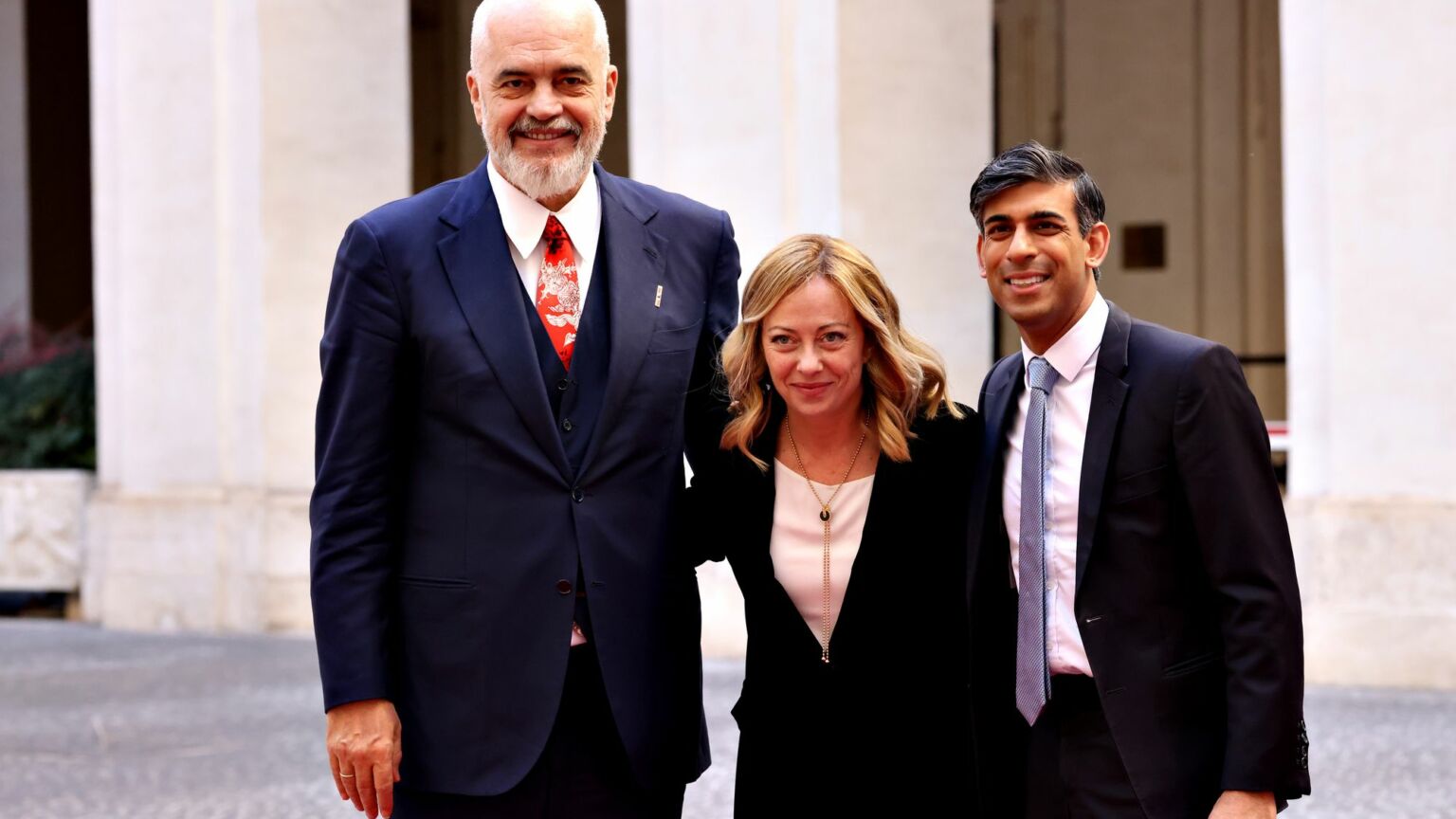How Italy and the UK lost control of their borders
Rishi Sunak and Giorgia Meloni are failing both migrants and their own citizens.

British PM Rishi Sunak spent last weekend cosying up to Italian PM Giorgia Meloni at the Atreju festival, organised by Meloni’s Brothers of Italy party. For both, it was a chance to discuss how best to tackle illegal immigration.
Superficially, the UK and Italy appear to be in similar predicaments. Both are struggling to cope with migrants being illegally trafficked into their countries via small boats. Both are attempting to deter these migrants by pledging to resettle them in a third country – Rwanda in the UK’s case and Albania in Italy’s. And both are being thwarted by unelected bodies in their efforts to do so. The European Commission is still analysing the agreement between Italy and Albania, and the UK’s agreement with Rwanda has been undone by a Supreme Court ruling.
Yet there are significant differences between the situations of the UK and Italy. For a start, the scale of illegal immigration into Italy is far greater than that into the UK. This year alone, 154,000 migrants have tried to enter Italy illegally. This dwarfs the 53,000 detected trying to enter the UK illegally in the year ending June 2023.
Moreover, Italy’s problems with illegal immigration stretch back far further. The number of arrivals were consistently over 100,000 during much of the mid-2010s. Indeed, Meloni’s Brothers of Italy party won the 2022 election partly after pledging to clamp down on illegal immigration. So far these pledges have come to nothing, with figures rising again this year. What’s more, Italy has increased its quota for legal visas for non-EU citizens to work in Italy to 136,000 this year – the highest quota since 2008.
The differences between the UK’s and Italy’s situations go far deeper than the numbers. Since the UK left the EU, it has regained a great deal of sovereignty over its borders, even if it is hamstrung to some extent by the European courts. In contrast, Italy remains an EU member state and, as such, has no real control over its own immigration policies. It has to do what the EU stipulates.
Since 2013, EU countries have been bound by the Dublin regulation. Under this rule, whichever EU country an asylum seeker first sets foot in is responsible for processing him. Inevitably, this means that Italy, Spain, Greece and Malta have had to shoulder the bulk of the responsibility for dealing with illegal migrants arriving by sea. A new migration deal was struck this week, giving the EU’s border countries more power to deport failed asylum seekers, but the fundamental problems remain.
Unfortunately, the governments of Italy and Britain seem intent on outsourcing their responsibilities to third countries – namely, Albania and Rwanda. They wrongly believe that the threat of being processed and resettled elsewhere will deter people from arriving in small boats.
The problem is that, right now, asylum seekers are only able to make their claims once they are on European soil. This gives people a clear incentive to make the perilous journey across the Mediterranean or the English Channel and try their luck on arrival. The result is that thousands of migrants are trafficked into Europe in dangerously overcrowded and unseaworthy vessels. Indeed, just last week more than 60 people were reported to have drowned after their boat sank near north Africa.
Both Italy and the UK talk a tough game about taking on the traffickers. But the best way to do this would be to break their business model. It would surely help to reduce illegal immigration and save lives in the Mediterranean if those currently paying traffickers to access the EU or the UK were able to use safe and legal routes instead. Meanwhile, those who continue to enter illegally could be more manageably dealt with.
Unfortunately, none of this is possible when governments refuse to take responsibility for their own borders. As long as Italy and the UK are determined to outsource their migration policies, they will never get to grips with this crisis.
Dominic Standish lectures for the University of Iowa and is the author of Venice in Environmental Peril? Myth and Reality.
Picture by: Getty.
To enquire about republishing spiked’s content, a right to reply or to request a correction, please contact the managing editor, Viv Regan.








Comments
Want to join the conversation?
Only spiked supporters and patrons, who donate regularly to us, can comment on our articles.